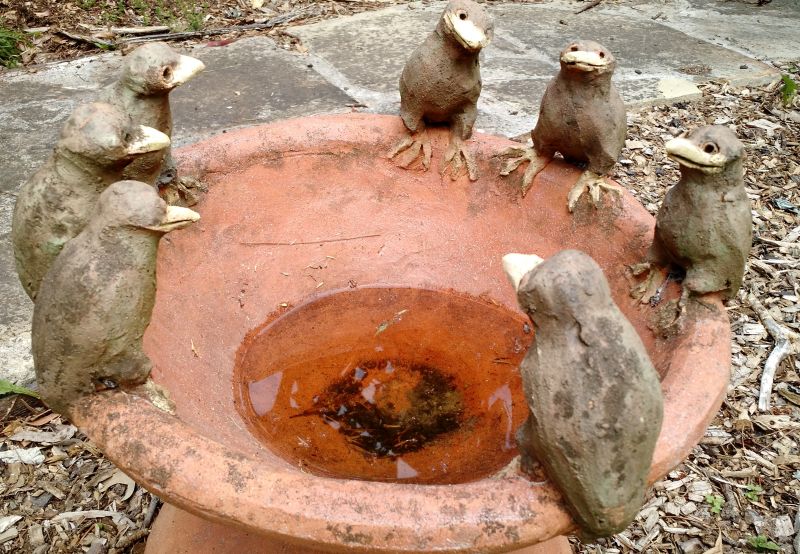Maria Ciavarella
Helen Simpson, from the Mushroom Shed, visits the garden of Maria Ciavarella, from Donvale.
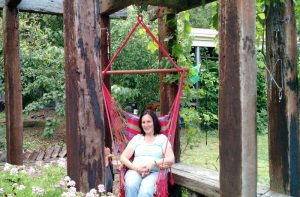 Maria Ciavarella is well known around North East Melbourne for the informative and practical workshops that she runs, with topics ranging from sustainable home growing food practices to food preserving, jam and passata making. Meeting Maria for the first time, I am struck by her generosity – from the fresh, delicious scones that await my arrival to the huge quantity of mulberries she picks for me from the largest mulberry tree I’ve ever seen – whilst we talk in her garden.
Maria Ciavarella is well known around North East Melbourne for the informative and practical workshops that she runs, with topics ranging from sustainable home growing food practices to food preserving, jam and passata making. Meeting Maria for the first time, I am struck by her generosity – from the fresh, delicious scones that await my arrival to the huge quantity of mulberries she picks for me from the largest mulberry tree I’ve ever seen – whilst we talk in her garden.
Maria grew up in an Italian family, who grew and preserved their own food. Not being interested as a teenager, she found her passion for growing food after moving out of home and having her own growing space. Whilst a maths and science teacher by profession, Maria’s food-growing passion eventually dominated and she changed her career totally by moving into the nursery industry, working for Bulleen Art & Garden (BAAG) for almost twenty years.
It was at BAAG that Maria managed to combine her previous teaching skills with her love of food growing, as she started presenting some of the classes run at the nursery. Increasing her knowledge base and contact with the local community through her working environment, one thing lead to another and soon she was presenting on a wider range of topics and being asked to do presentations by various local community groups and Councils, setting up her current business ‘My Green Garden’ to handle the volume of work in the process.
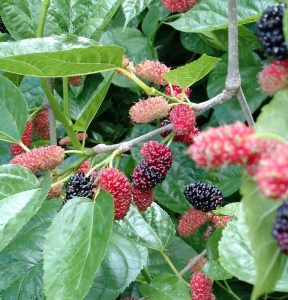 Maria shows me around her kitchen – a huge table and island bench where the preserving, passata and jam-making workshops are done. A visitor arrives to pick mulberries for an event and Maria’s generous nature comes to the fore again, as she offers many of her preserves to the visitor for the event. We move outside to see where the produce has come from.
Maria shows me around her kitchen – a huge table and island bench where the preserving, passata and jam-making workshops are done. A visitor arrives to pick mulberries for an event and Maria’s generous nature comes to the fore again, as she offers many of her preserves to the visitor for the event. We move outside to see where the produce has come from.
Having moved from a small block in Bulleen to their current half acre location in Donvale, much work has been required to prepare the block for growing food. Pine trees dominate the area, so careful selection of site has been critical to ensure that the sun gets in. Significant clearing of weeds, such as bamboo and cotoneaster, was also necessary before any planting occurred.
With a clay-based soil, Maria has installed no-dig garden beds, building up the soil level on top of the existing clay rather than digging down. A lot of compost has been critical to success, with chook manure and wood shavings being two of the best ingredients. Maria firmly believes that feeding the soil is the best way to get healthy plants, with planting being the easy part after the soil has been prepared. Added to that are autumn leaves from the garden, coffee grounds from a local coffee shop plus any other nutritional ingredients from around the garden such as green manure crops. Maria’s no dig garden beds need to be topped up 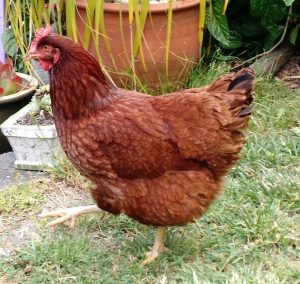 every year, as the soil she creates is used up by hungry veggies.
every year, as the soil she creates is used up by hungry veggies.
Chooks are a critical part of Maria’s garden, whether to provide manure, eggs, eat recycle scraps or clean up fallen fruit and decaying vegetable matter. An elaborate hen house (which includes Maria’s own sizeable shed) protects the chooks at night, whilst they roam freely by day.
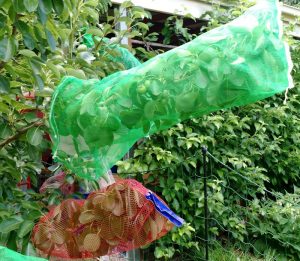 Pride of place are the many fruit trees, which include olives, peaches, nectarines and pears. Society garlic is grown around the base of many of these well-pruned trees (Maria also runs tree pruning workshops) and Maria shows me how she uses recycling net bags over her pears to protect the fruit from coddling moth and other pests.
Pride of place are the many fruit trees, which include olives, peaches, nectarines and pears. Society garlic is grown around the base of many of these well-pruned trees (Maria also runs tree pruning workshops) and Maria shows me how she uses recycling net bags over her pears to protect the fruit from coddling moth and other pests.
Fence lines are well-utilised for berries and a brick wall fence in a hot position provides heat for growing the largest banana trees I’ve ever seen in Melbourne. Maria informs me that they are her husband’s pride and joy and have produced two good-sized bunches of bananas thus far. A large pond houses some well-fed goldfish, with an aqua 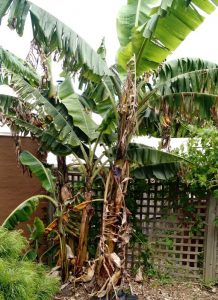 project a possibility at a later date.
project a possibility at a later date.
Maria likes to “make everything as practical and achievable as possible” and I am impressed by the way she seemingly effortlessly combines her gardening and food production, family responsibilities and business all together. Her garden is one of the tidiest I’ve seen, which is testament to the time she spends in it. Challenges in the garden include watering over summer (four tanks are used, but they eventually run out) and pest control (where Maria will often use upturned half cut bottles over tender seedlings to protect them at night).
Maria has several gardening tips:
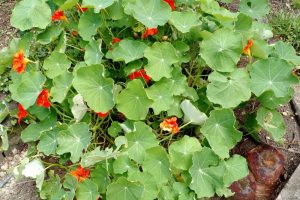 The best fertiliser and pest control is yourself – walk regularly through your garden, observe changes and learn from them.
The best fertiliser and pest control is yourself – walk regularly through your garden, observe changes and learn from them.- Keep plants shaded over hot weather, and also when on summer holidays to help them survive.
- Don’t plant seedlings too close if they are going to get big, but do inter-plant with fast growing seedlings (e.g. lettuce) while you wait for them to grow.
- Plant what you like to eat – and always grow your own herbs as they are easy!
- Remember the ‘P’ letter in gardening: Patience and Perseverance. Learn from your mistakes or problems and don’t let them put you off.
For the future, Maria plans to expand her food growing and also her business ‘My Green Garden’, to spread the word about the satisfaction people can get from taking control over their food production – even to a small extent. Look out for Maria’s ever increasing array of classes, run from her home and other locations – visit Maria’s website for more information.
Any finally, Maria’s favourite tomato for passata making is Napoli Paste – a dense, oval shaped tomato with not too much water inside, which grows prolifically. Seed is readily available – check the internet for suppliers.

